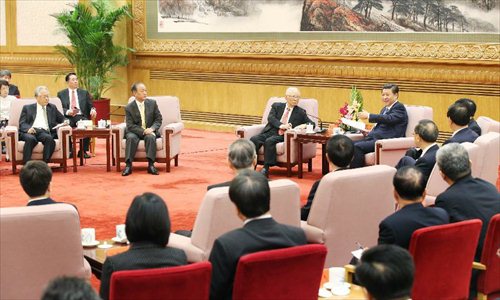Xi clarifies Taiwan reunification position to visiting delegation
Nation’s revival a positive opportunity for Taiwan: Xi

Xi Jinping (1st R rear), general secretary of the Communist Party of China Central Committee, meets with a Taiwanese delegation of pro-reunification groups at the Great Hall of the People in Beijing, capital of China, Sept. 26, 2014. Photo: Xinhua
Xi Jinping, general secretary of the Communist Party of China (CPC) Central Committee, has reiterated the necessity of the "peaceful reunification; one country, two systems" guideline on solving the Taiwan question, demonstrating the Chinese mainland's unwavering stance on national reunification.
Addressing a visiting delegation of pro-reunification groups from Taiwan on Friday, Xi said the guideline is the best way to realize national reunification.
"'One country, two systems' in Taiwan will take the island's actual conditions into consideration, absorb suggestions from both sides and fully consider the interests of Taiwanese compatriots," he said, adding that Taiwanese compatriots should also try to understand the mentality and feelings of the 1.3-billion mainlanders.
"It is a clarification on our stance on the Taiwan question. It has always been our policy to strive for peaceful reunification through peaceful development, but both sides across the Straits have misinterpreted the policy in some way when too much attention is paid to peaceful development only," said Wang Jianmin, a Taiwan affairs research fellow at the Chinese Academy of Social Sciences.
Xi has demonstrated his determination to push forward relations between the mainland and Taiwan, which have been separate since 1949. Last October the leader said, "In the long run, the long-standing cross-Straits political disputes must be gradually and eventually resolved. We cannot hand those problems down from generation to generation."
Wang said Friday's re-emphasis on peaceful reunification demonstrates the mainland leadership's sense of historical mission in ending the deadlock.
The meeting is believed to be the highest profile meeting between the mainland's top leader and pro-reunification groups from Taiwan. It delivered the strongest support for the island's most staunch advocates of national reunification, according to mainland experts.
The delegation, led by New Alliance Association Chairman Hsu Li-nung and New Party Chairman Yok Mu-ming, started a six-day visit to the mainland on Wednesday.
"Xi's speech has inspired us pro-reunification groups," Hsu told the Xinhua News Agency.
"Despite the possibility the approach to reunification may be altered in accordance with the changes of time and conditions, our goal of achieving reunification never wavered," the 95-year-old chairman said.
Yok said Xi's words have clearly answered some people's concerns over reunification in Taiwan. "The mainland's good will and sincerity have also been explicitly expressed in his talks," Yok said.
At the meeting, Xi also warned of secessionism in the island, noting that secessionists would not give up easily and would continue to provoke cross-Strait enmity and hinder exchanges and cooperation.
"Curbing secessionism is a must for ensuring peaceful development of cross-Straits ties," said the leader. "No secessionist act will be tolerated and the path of 'Taiwan independence' is unfeasible."
"In light of the Scotland referendum and 'Occupy Central' campaign in Hong Kong, the 'one country, two systems' in Taiwan may exhibit more flexibility and openness," Wang said.
Recently, cross-Straits cooperation has encountered some difficulties. In March, demonstrations against a cross-Straits service trade pact paralyzed Taiwan's legislative authority, leading to concessions by the island's authorities and a pledge to review the pact clause-by-clause, which has held up the signing of the deal.
Xi stressed the nearing of the goal of the Chinese nation's great revival, which he said is good news and a historical opportunity for Taiwan.
"The national reunification we advocate is not merely unification in form, but more importantly, a spiritual connection between the two sides," Xi noted.
Instead of mere slogans, the spiritual connection will naturally be built based on strong cross-Straits economic ties that have and will continue to benefit the people on the island, Xu Shiquan, vice chairman of the National Society of Taiwan Studies in Beijing, told the Global Times.
In an article published in the bi-weekly Qiushi magazine earlier this month, Zhang Zhijun, head of the Taiwan Affairs Office of the State Council, said the mainland will work to understand the practical needs of people in Taiwan and take active and effective measures to take care of vulnerable people, "so that more people in Taiwan can benefit from cross-Straits economic cooperation."
He also vowed to create the conditions for more exchanges between young people across the Straits, so as to let those in Taiwan "experience the trend of peaceful development of cross-Straits relations."
In late June, as the first top mainland official in charge of cross-Straits relations to visit Taiwan, Zhang spent much of his time in the island to reach out to grass-roots people, who were deemed to have benefited less from cross-Straits cooperation.
Xinhua contributed to this story